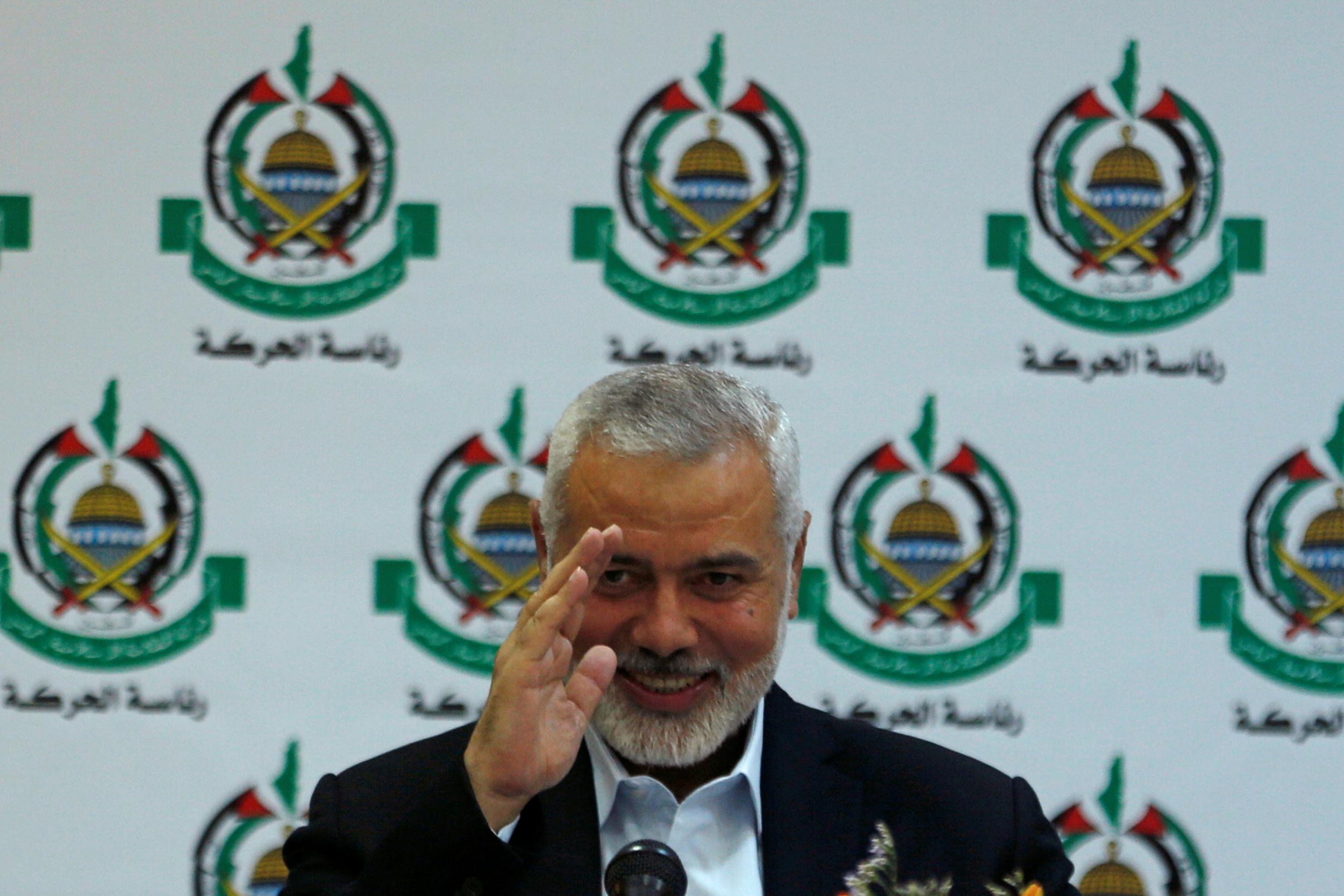Hamas chief says ceasefire talks with Israel in a 'danger zone'
Ismail Haniyeh warns Palestinians will turn to 'armed resistance' if Israel attempts to annex West Bank

Your support helps us to tell the story
From reproductive rights to climate change to Big Tech, The Independent is on the ground when the story is developing. Whether it's investigating the financials of Elon Musk's pro-Trump PAC or producing our latest documentary, 'The A Word', which shines a light on the American women fighting for reproductive rights, we know how important it is to parse out the facts from the messaging.
At such a critical moment in US history, we need reporters on the ground. Your donation allows us to keep sending journalists to speak to both sides of the story.
The Independent is trusted by Americans across the entire political spectrum. And unlike many other quality news outlets, we choose not to lock Americans out of our reporting and analysis with paywalls. We believe quality journalism should be available to everyone, paid for by those who can afford it.
Your support makes all the difference.Hamas leader Ismail Haniyeh has said Gaza ceasefire agreements with Israel were in a “danger zone" and rejected next week’s US-sponsored Middle East economic and peace conference in Bahrain, saying it would amount to Arab “normalisation” of ties with Israel.
Mr Haniyeh, the head of Hamas’s political wing, also warned that Palestinians would turn to “armed resistance” if Israel tried to annex the West Bank. It followed statements by US officials that the Israeli authorities had the right to annex “portions” of the occupied Palestinian territory.
The leader called on Bahrain's King Hamad "not to hold this workshop," which is set to launch on Tuesday in Manama, saying Palestinians across the territories would hold massive demonstrations during the event.
Mr Haniyeh, who took office in 2017, blamed the Israelis for stalling the peace process, citing several points including the failure of electricity and water projects due to Israeli bans on the import of certain materials into the Strip. He also referenced the restrictions on the distance into the sea Gaza fishermen are permitted to fish.
Israel has yet to comment.
“The understandings are in a critical situation because of no commitment of [the Israelis] to respect and abide by the agreements,” he said referencing the conditions of a ceasefire.
“Until now the Palestinians did not feel the fruits of these understandings.”
He added that the Israelis were using the fishing zones as a “form of blackmail”.
Gaza has been crippled by a 12-year Israeli and Egyptian imposed the blockade that was imposed after Hamas violently seized control of the coastal enclave in 2007.
Israel, and several other countries, consider Hamas a terrorist group and says the blockade is needed to keep the group from arming.
Cross border exchanges of fire have flared over the last year and last month both sides appeared on the brink of war.
Mr Haniyeh warned that if Israel continued to deny Palestinian rights there could be no “peaceful” solution to the crisis, hinting peace talks will collapse imminently.
“I don’t think that this peaceful and political path will reach a goal that will be accepted and satisfactory to everybody,” he said.
The US is due to host a peace and economic conference next week in Bahrain, during which they were supposed to unveil their long-awaited and divisive peace plan.
The Palestinians have already rejected the document saying it will likely be too pro-Israeli.
Several American officials, including Donald Trump’s special envoy to the Middle East, Jason Greenblatt, and his ambassador to Israel David Friedman further angered Palestinians when they said that Israel has the right to annex a “portion” of the West Bank.
This would be illegal under international law.
But it also dashed hopes that an independent sovereign Palestinian state would be entrenched in Mr Trump’s peace plan.
Mr Haniyeh warned of “armed resistance” if annexation were to happen.
“If we had to, we would,” he added firmly.
He also laid the blame of Gaza’s woes on Hamas’s rival, the Fatah-dominated Palestinian Authority, which runs The West Bank.
The bitter fight between the two factions have seen the PA cut salaries of its employees in Gaza and a few years ago slash electricity supplies, in a bid to force Hamas from power.
This has compounded the humanitarian crisis in the tiny enclave, which is home to nearly two million people, well over half of whiom live under the poverty line.
On Thursday, Mr Haniyeh said he was willing to meet Palestinian president Mahmoud Abbas, “without preconditions”, which would mark the first meeting between the two since Mr Haniyeh took office as head of Hamas.
He said the rivalry between the Palestinian factions was at a “dangerous” stage.
Earlier in the day, Qatar began distributing $100 payments to 60,000 poor Palestinian families in Gaza. It is the the latest tranche of money agreed as part of the November ceasefire.
Agencies contributed to this report .
Join our commenting forum
Join thought-provoking conversations, follow other Independent readers and see their replies
Comments